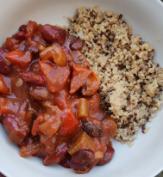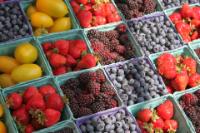References
British Dietetic Association (2017) ‘Policy Statement: Sustainable Diets.’ Birmingham: British Dietetic Association. Available at: (opens in a new window)https://www.bda.uk.com/improvinghealth/healthprofessionals/policy_statements/policy_statement_sustainable_food.pdf BDA 2017
Department of Health (2017) ‘Healthy Ireland Survey 2017: Summary of findings.’ Available at: (opens in a new window)http://www.healthyireland.ie/wp-content/uploads/2017/10/Healthy-Ireland-Survey-Wave-3-Report-1.pdf
Food and Agriculture Organisation (2010) ‘Sustainable diets and biodiversity: Directions and solutions for policy, research and action.’ Rome, Italy: FAO. Available at: (opens in a new window)http://www.fao.org/docrep/016/i3004e/i3004e.pdf
Willett et al. (2019) ‘Food in the Anthropocene: the EAT-Lancet Commission on healthy diets from sustainable food systems.’ The Lancet Commissions. Available at: (opens in a new window)https://www.thelancet.com/pdfs/journals/lancet/PIIS0140-6736(18)31788-4.pdf?utm_campaign=tleat19&utm_source=HubPage
Irish Nutrition and Dietetic Institute (2016). ‘Fabulous Fibre.’ INDI. Available at: https://www.indi.ie/images/fact_sheets/Fabulous_fibre_fact_sheet_2.pdf
Macdiarmid, J. (2016) ‘Shifting to Sustainable Diets.’ Available at: (opens in a new window)https://academicimpact.un.org/content/shifting-sustainable-diets
Vieux, F. et al. (2018) ‘Dietary changes needed to improve diet sustainability: Are they similar across Europe?’, European Journal of Clinical Nutrition, 72 pp. 951-960.
World Health Organisation (2018). ‘Overweight and Obesity.’ Available at: (opens in a new window)https://www.who.int/news-room/fact-sheets/detail/obesity-and-overweight
 The sustainability of the food we eat every day is now a key global and public health issue. The United Nations estimates that by 2050 the world’s population will have reached 9.8 billion people, which is a lot of hungry mouths to feed. One of the greatest challenges the world faces today is to re-structure our food systems to deliver enough nutritious food for this rapidly growing population, while minimising the environmental impact of doing so (Macdiarmid, 2016).
The sustainability of the food we eat every day is now a key global and public health issue. The United Nations estimates that by 2050 the world’s population will have reached 9.8 billion people, which is a lot of hungry mouths to feed. One of the greatest challenges the world faces today is to re-structure our food systems to deliver enough nutritious food for this rapidly growing population, while minimising the environmental impact of doing so (Macdiarmid, 2016). A great place to start to get in a more sustainable manner is to add some meat-free meals and/or days into your week. It is the simplest and most impactful thing we can change about our diets to help the environment, particularly in the case of red and processed red meat (British Dietetic Association, 2017). Many classic meat-based recipes can be made vegetarian easily and deliciously. For example, why not try a Spicy Bean Chili, or a Lentil Bolognese this week?
A great place to start to get in a more sustainable manner is to add some meat-free meals and/or days into your week. It is the simplest and most impactful thing we can change about our diets to help the environment, particularly in the case of red and processed red meat (British Dietetic Association, 2017). Many classic meat-based recipes can be made vegetarian easily and deliciously. For example, why not try a Spicy Bean Chili, or a Lentil Bolognese this week? Just 27% of the Irish population in 2017 were meeting, at the time, their recommended daily intake of 5 servings of fruits and vegetables (Department of Health, 2017). It is now recommended to eat up to ‘7 A Day’ every day. Fruits and vegetables are nutritional powerhouses, full of natural sugars, fibre and lots of micro-nutrients. For the best effect on the environment, we should aim to buy seasonal produce where possible, and ideally go for loose fruit and vegetables, minimising the plastic packaging. Approximately one third of all food produced ends up being food waste, so it’s essential to ensure we buy only the volume we need and use up these foods while fresh. This Lentil Bolognese recipe will allow you to put those vegetables to good use!
Just 27% of the Irish population in 2017 were meeting, at the time, their recommended daily intake of 5 servings of fruits and vegetables (Department of Health, 2017). It is now recommended to eat up to ‘7 A Day’ every day. Fruits and vegetables are nutritional powerhouses, full of natural sugars, fibre and lots of micro-nutrients. For the best effect on the environment, we should aim to buy seasonal produce where possible, and ideally go for loose fruit and vegetables, minimising the plastic packaging. Approximately one third of all food produced ends up being food waste, so it’s essential to ensure we buy only the volume we need and use up these foods while fresh. This Lentil Bolognese recipe will allow you to put those vegetables to good use!